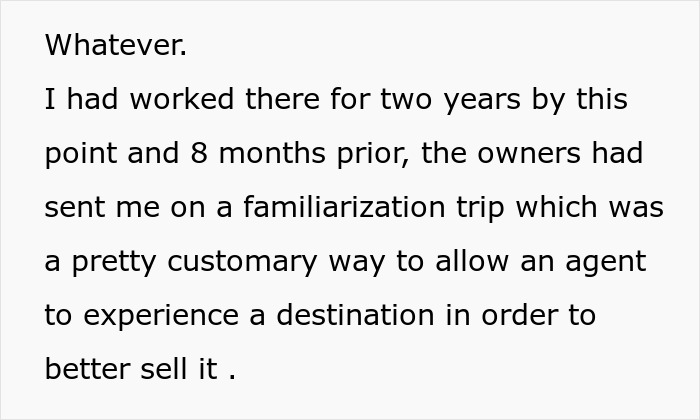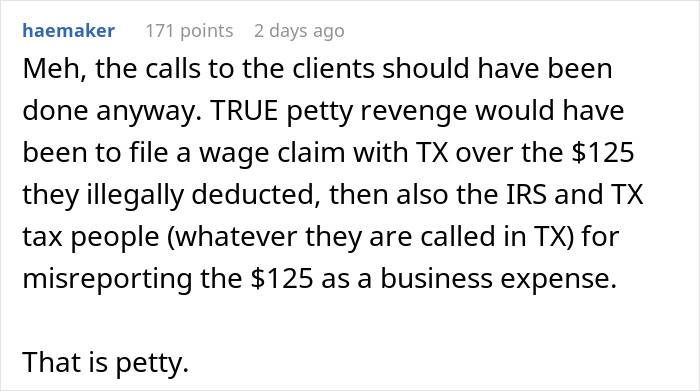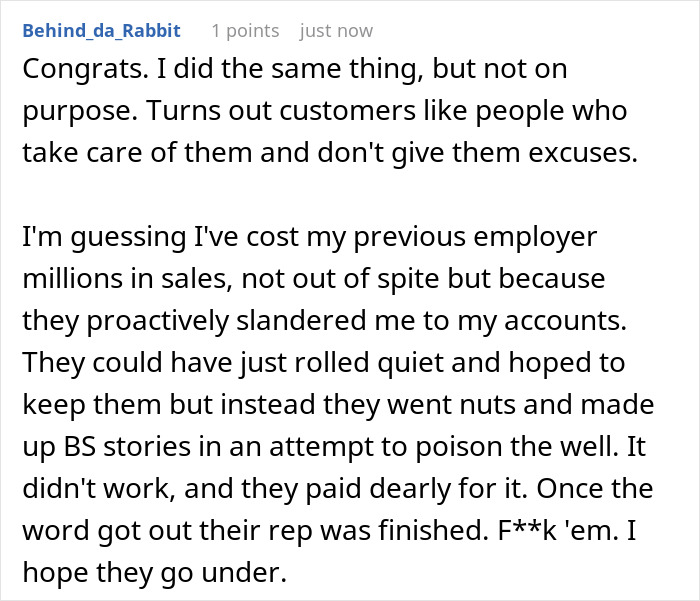No one likes a scrooge, whether it’s a family member, a friend, or especially—a boss. Their ways of saving money for the company often come at the expense of the employees.
The redditor u/jlzania had to deal with a cheap boss who deducted money from the final paycheck for her work-related trip. She told the ‘Petty Revenge’ community that the supervisor showed her the door right after she gave her two weeks’ notice. Before leaving, the OP took what she thought belonged to her, which resulted in the greedy boss losing money.
Bored Panda has reached out to the author of the post and she was kind enough to answer some of our questions. Scroll down to find our interview with her.
Greed can lead to big problems, especially in a professional environment

Image credits: JESHOOTS.COM (not the actual photo)
A penny-pinching employer deducted money from this person’s final paycheck, so they caused them trouble that resulted in a way larger financial loss









Image credits: Onur Binay (not the actual photo)


Some regulations might restrict former employees from taking clients with them, but situations like that happen nevertheless

Image credits: Headway (not the actual photo)
Well-connected employees can make or break your business. The same way they bring clients to your company upon arrival, they can easily take them when leaving. That’s why, even though each situation is different, there are certain laws and regulations that might help companies avoid such situations. In the US, for instance, a lot of states have adopted a form of “Uniform Trade Secrets Act”, and under certain circumstances, client information can be one of such secrets.
When it comes to work, most regulations end with the termination of the employment contract. However, there can be some post-termination restrictions as well. For example, there might be a non-solicitation agreement that constrains the former employee from reaching out to clients or colleagues regarding business matters for some months after leaving.
Travel agents often develop a connection with their clients, which is one of the reasons they might follow them elsewhere

Image credits: Cytonn Photography (not the actual photo)
Taking your clientele with you is not specific to a certain profession; but it’s not surprising that clients often stay with their travel agents even if they go elsewhere. Once you find a reliable one that meets your expectations for a trip, it only makes sense to go back to them for your next adventure. And even though a lot of people nowadays plan their journeys themselves, some still prefer to take the worry-free approach and leave it in the safe hands of their travel agents. When it comes to air travel, for instance, 43% of travelers still prefer to book their flights with them.
The OP told Bored Panda she liked her job in the travel industry: “I enjoyed working as an agent. I liked solving problems, I liked helping people get the most for their money and I really liked it when my clients returned after a vacation to let me know that I had helped them have a wonderful time.”
Now, in 2023, there are nearly 85,000 travel agency businesses in the US. As for the rest of the world, the number reaches 200 thousand, employing more than two million people globally. With competition this high, it’s important to maintain a good relationship with your clients. It’s also a good idea to maintain a good relationship with the boss. Unfortunately, that wasn’t the case in the OP’s story—the interoffice conflict eventually led her through the door.
The OP is far from the only one who has encountered a problematic boss

Image credits: Sora Shimazaki (not the actual photo)
As a matter of fact, nearly 60% of employees leave because of their boss. Moreover, an even larger percentage (65%) of employed people despise their superior so badly, they would choose them leaving over a raise.
The OP decided not to bear with the managers anymore. And that’s when they showed their true colors—the stingy boss deducted money for what was a work-related trip. It wasn’t a large amount, but in a situation as such, it’s not the sum that matters. “What upset me the most was the absolute pettiness of the agency owners,” she said. “Familiarization trips were common and to attempt to ‘punish’ for quitting by deducting the $125 from my paycheck was just so small but also so typical of these people.”
Not spending money left, right and center is the sensible way to go, but there’s a line between being frugal and cheap. According to the US News, one of the main differences between the two is that the latter tends to save money at the expense of others. The penny-pinching employer wanted to make sure the company was compensated, despite it being at the expense of their employee, and despite all the business she brought to the company. Maybe that’s why she took that business elsewhere later on.
“It was an effort to prove that they did not exercise power over me. They were condescending throughout the time I worked for them and failed to recognize that we were equals and I was not supposedly subservient simply because they signed my checks,” the author of the post told Bored Panda.
People in the comments had doubts that required more information from the OP



The readers reacted in different ways








Some of them shared similar stories


 Follow Us
Follow Us





